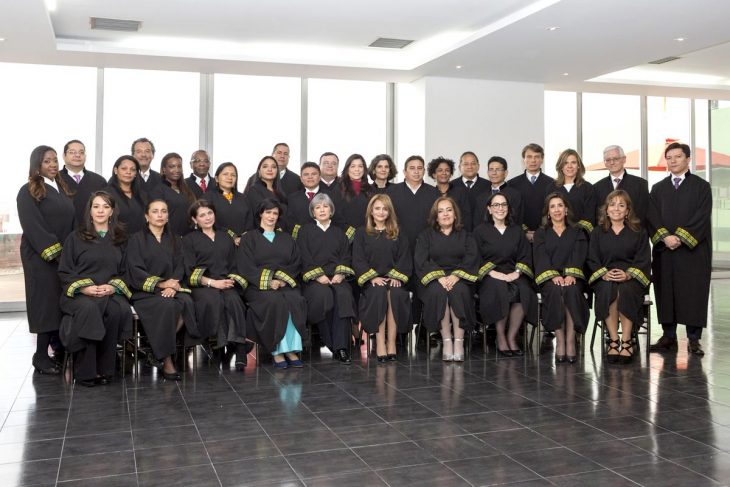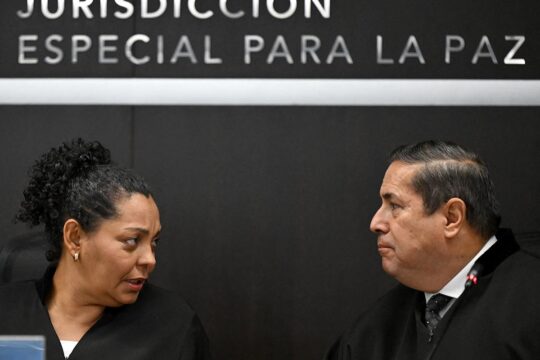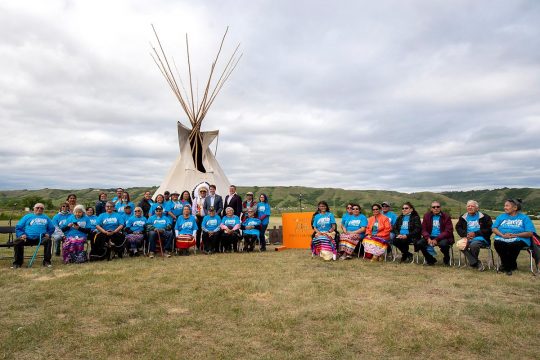- BACKGROUND: THE PEACE AGREEMENT AND ETHNIC RIGHTS IN COLOMBIA
With over 8,375,858 victims, Colombia has endured more than 50 years of armed conflict, where the left-oriented FARC-EP guerrilla played a central role. Since 2012, former President Juan Manuel Santos and the FARC-EP settled for a political negotiation towards the end of violence and the beginning of peacebuilding. In 2016, both key actors achieved internationally celebrated peace accords, also known as The Final Agreement.
The agreement covers five main topics: land reform, political participation, solutions to the illicit drug problem, disarmament and civil reincorporation, and reparation to victims. The latter foresees a Comprehensive System, which includes the Special Jurisdiction for Peace (SJP) as its justice segment. The SJP has the exclusive competence to rule over crimes committed in the context and because of the armed conflict. Additionally, as a result of the participation of Afro-Colombian and indigenous peoples in the negotiation, the agreement also includes a chapter aimed to protect ethnic rights and ensure peacebuilding on their territories.
The Colombian Constitution recognises an essential number of ethnic rights. Overall, they lack clear regulation, hampering their effective guarantee. Through its precedent, the Constitutional Court has set some rules to clarify their application. The right of indigenous authorities to exercise their judicial systems, better known as Special Indigenous Jurisdiction (SIJ), is one of the most reviewed topics by the constitutional jurisprudence.
Ethnic judicial systems are linked to indigenous self-determination: the right of their people to freely decide their political status and self-government in matters related to their internal affairs and social order. However, in Colombia, self-determination has been restricted by the Constitutional Court who has the authority to resolve any jurisdictional conflicts arising between indigenous authorities and ordinary judges. The Court does so, however, without considering any intercultural methodologies towards strengthening self-determination or evoking the restorative nature of indigenous justice.
With the creation of SJP, we must ask how to outpace preceding obstacles and introduce effective coordination between SIJ and SJP to pursue transitional justice through intercultural methodologies aimed towards peacebuilding.
- THE DILEMMA BETWEEN BOTH JURISDICTIONS
The SIJ has worked as a mechanism to regain social control over ethnic territories and restrain war crimes against them. Indigenous authorities have prosecuted armed actors alleged to have committed crimes against their people. Depending on the criminal offence, sentences can reach the maximum penalty of 60 years in prison without parole or settle with alternative punishments for restorative purposes. These trials can involve the deliberation between thousands of authorities who rule in assemblies by consensus. Before the creation of SJP, the national justice system has mostly respected some of these decisions.
However, to fulfil its purposes of accountability and reparation for victims, and grant legal security for ex-combatants, the SJP has the competence to prosecute all criminal offences committed in the context of the armed conflict, especially those related to grave breaches of International Humanitarian Law and gross human rights violations. Moreover, the SJP can also review previous verdicts. Therefore, SJP’s judicial powers prevail over other jurisdictions.
Consequently, punishments agreed by thousands of indigenous authorities against prosecuted armed actors can be the subject of adjustments or pardon by SJP, despite the significance of the sanctions and the need to maintain restrains against new armed groups operating in their territories. Although a recent decision of the Constitutional Court clarified that SJP does not necessarily prevail over SIJ, the sentence only explained that their coordination had to be submitted to prior consultation.
- A PATH TOWARDS COORDINATION
In 2017 – to resolve any dispute among both jurisdictions – the government carried out the prior consultation of the statutory law on the SJP, in which indigenous organisations were able to introduce general articles that can be resumed in three core principles: ethnic legal assistance, inter-jurisdictional communication, and actions against any risk of extermination.
The specific regulations regarding those principles were later included in a chapter of the Internal Rules of the SJP. Today, the challenge to put them into action rests on the willingness of the magistrates of the SJP, especially on the first four indigenous lawyers selected as judges for a high judicial body in Colombia, who also take part of an Ethnic Committee created to guide the SJP’s Chambers in their task to guarantee ethnic rights. The legal competences of the SJP in these matters can be described as follows:
a. Ethnic legal assistance
The SJP has the task of designing an ethnic legal assistance system to guarantee indigenous victims and ex-combatants the rights to justice, legal representation, effective defence, due process while preserving their culture. 11% of registered victims have an ethnic heritage; and, by extension, a different culture, language and cosmogony. Moreover, the FARC-EP’s census indicated that 18% of their ex-combatants are also indigenous who kept their native language and cultural background. Hence, many of them do not speak fluent Spanish, do not fully comprehend the benefits of the SJP nor other aspects of the judicial system.
The cultural gap brings up two predicaments. First, there is a need to satisfy the victims' right to justice by ensuring them ethnic legal representation in every instance of the procedure; an anti-discrimination policy; and a special protocol regarding victims of sexual assault, attending to the cultural impact of this type of crime upon them. Secondly, a particular defence system for indigenous ex-combatants needs to be established (including interpreters and expert advocates), and the support of their authorities guaranteed, bearing in mind that perpetrators have pledged to offer the complete truth on their conduct or face a full conviction.
b. Inter-jurisdictional communication
Ensuring an intercultural and inter-jurisdictional communication may be the answer to developing adequate coordination between both jurisdictions. It has to: respect the jurisdictional authority of indigenous authorities; design the process to ensure that magistrates and authorities agree on the cases and, even, rule over them; devise a method to transfer competence between each other; resolve any conflict of competence raised among them; culturally adapt the locations where convicted indigenous perpetrators will serve their sentences; promote restorative punishments with ethnic standards.
In 2017, the Consejo Regional Indígena del Cauca (CRIC) and the Executive Secretary of the SJP agreed on the first coordination protocol. The document endorses the articulation between both judicial systems and launches strategies concerning those convicted by the SIJ.
c. Ending the imminent risk of extermination
The ethnic chapter of The Final Agreement also serves as a reparation measure in and of itself, as indigenous peoples bore the brunt of the conflict. The Constitutional Court has stated that, because of their natural resources and strategic locations, the war has been carried out mainly on ethnic lands. Subsequently, 102 indigenous groups have faced an imminent risk of extinction, and 60% of them will disappear if actions are not taken.
The decisions of the SJP are meant to be guarantees for non-repetition and measures against the risk of extermination. To achieve these goals, the SJP has the duty of setting differential criteria that allow magistrates to select, prioritise and rule on strategic cases regarding war crimes against indigenous people. SJP also must determine whether those conducts are related to their risk of extermination; and examine the reports of indigenous organisations concerning demeanours committed against them that, because of their severity, deepened such risks.
- SOME CHALLENGES
There is legal ground to coordinate both jurisdictions. Nonetheless, its effectiveness depends on the willingness of the SJP to restore indigenous peoples’ rights through an intercultural justice system. Although the SJP relies on its Ethnic Committee to do so, it is still a minority, and their influence on crucial decisions is tied to the attitude of the rest of the judicial body. So, it is necessary to gather allies who can provide an external point of view to improve SJP’s performance.
The international community has played a vital role in the Colombian peacebuilding process. Therefore, it can prolong its support through two actions. First, monitoring how the SJP is applying these principles. Hence, a list of indicators should be formulated to establish how the differential rights are being guaranteed. This method should help the SJP to address these challenges and to ensure prospective and intercultural justice. Secondly, cooperation agencies should include an agenda routed to strengthen the ethnic judicial systems, and to support, with financial aid, the locations where the convicted will serve their sentences.
Finally, the SJP not only has to provide effective transitional justice through intercultural methodologies, by cooperating with SIJ, it also has the opportunity to set some lessons towards democratic features of post-conflict societies by extending the mechanisms available to grant victims their right to justice from a restorative perspective.
 OXFORD TRANSITIONAL JUSTICE RESEARCH
OXFORD TRANSITIONAL JUSTICE RESEARCH
This article has been published as part of a partnership between JusticeInfo.net and the Oxford Transitional Justice Research (OTJR), a network of high-level transitional justice researchers which is part of the University of Oxford. Justiceinfo.net publishes OTJR publications under the joint responsibility of its editor and OTJR.






